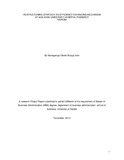| dc.description.abstract | Health is critical in life and drugs playa big role in ensuring that the sick recover and return to normal life activities. Pharmacy avails a service that is essential and policies affecting pharmacy practice in Aga Khan University Hospital Pharmacy, Nairobi and elsewhere do impact on health to a great extend. Restructuring of operations, processes and policies impact on service efficiency in hospital and it forms the base of this research. Has the restructuring enhanced efficiency and to what extend? Is a question to be answered. Key
variables that will be used as eye openers in revealing areas that have been restructured successfully and others that call for further restructuring and even further research have been identified.
Data collection methods used includes questionnaires and interview guides for the raw data and drop and pick approach was used. Observations and direct interviews also did help in collecting data. Organization records where available, did provide a good source of secondary data for analysis. Data collection methods used includes questionnaires and interview guides for the raw data and drop and pick approach was used. Observations and direct interviews also did help in collecting data. Organization records where available, did provide a good source of secondary data for analysis.
Quantitative data has addressed five main performance indicators that include pharmacy layout, the operational procedures, the staff attitude (positive and negative) and finally the expertise of the pharmacy professional. Qualitative data looks at verbatim responses given by the respondents during research interaction. The unit of analysis used is the job/ department of the various professionals found in a hospital. The respondents interact with the pharmacy department directly or indirectly on a daily basis.
In the findings, hours of operations in the pharmacy department are convenient to the users of the pharmacy. However, the waiting area needs further restructuring to create more comfort. Some form of pre-occupation should be introduced and space added. Regarding operations, the pharmacy is offering needed services to the people. However, customer service issues like prompt phone responses still needs attention. To curb this problem, the pharmacy information center/desk should have someone at all times to filter calls. Staff attitude and motivation is calling for further attention despite the efforts put in
place so far.
From the verbatim responses, the physical restructuring seems to have overshadowed the human needs element and hence the Maslow's hierarchy of needs could help enhance efficiency through this area. Courtesy seems to be eroding away. Doctors feel pharmacy gives correct billings while managers feel otherwise. Instructions for users of drugs are being given to satisfaction.
Prescription tum around timings (TAT) has been improved though it remains a source of most client complaints. Increase in prescription and income volumes point to restructuring benefits. The experience acquired by the institution should also be harnessed even in the pharmacy so that the situation where one has an old institution without experience due to staff tumover is put under control. Staff mentoring of new entrants should be nurtured with care.
There is a great need for organizations to go full circle in ensuring that cost of health and hence living comes down for the sake of both organizational growth and client faithfulness. This calls for avenues for all stakeholders in health provision chain to work together to bring down costs. Policies can be harmonized; common policy making teams should be encouraged to eliminate obstacles and resistance to policy change. Include insurance firms to shorten payment process.
Pharmacy unit kind of says goodbye and come again to dients, therefore further careful planning needs to be put in place to create a pleasant send off and hence create a repeat customer who is cheaper than looking for a new one. KeyWords:
Aga Khan University Hospital Nairobi, Pharmacy, Strategy, Efficiency, Policy, change, management, Restructuring, Service, Process, and Customer care, Client. | en_US |

